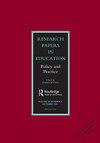Sociological perspectives on the mental health and wellbeing agenda in education
IF 2.1
3区 教育学
Q1 EDUCATION & EDUCATIONAL RESEARCH
引用次数: 0
Abstract
In the UK and other countries there is currently a salient mental health and wellbeing policy agenda which is playing out across the education system, including in schools, colleges and universities, as well as in adult community learning, early years settings and workplace training. It is being driven by perceptions of a crisis of mental health and wellbeing (Ecclestone 2014; Lewis, Ormerod, and; Ecclestone 2020), with educational settings viewed as key sites for intervention (DH and DfE 2017; DHSC and DfE 2018; Hurry et al. 2020). Heightened concerns about children and young people’s mental health and wellbeing have been a key driver for the agenda, and have been ratcheted up by the recent COVID19 and cost-of-living crises. During the pandemic there were fears about social isolation during periods of restrictions exacerbating mental health issues among the UK population (Mind 2020) and wellbeing problems associated with loneliness which were already highlighted by Teresa May’s UK government (HM Government/DCMS 2018). Reports highlighted the effect of this isolation on the mental health and wellbeing of some groups in particular, including children and young people (Mind 2020; ONS 2020b). There were also reports of increases in domestic violence, child abuse and alcohol issues among the UK population during the pandemic (Finlay and Gilmore 2020; Svensson and Robson 2020). The impact of the crisis on mental health inequalities, as the effects of the pandemic have ‘interacted with existing divides by income, age, gender and ethnicity and in many cases exacerbated existing inequalities’ (Blundell et al. 2020, 298) have been discussed, with reports highlighting the long-term nature of many of these effects (British Academy 2021). In terms of gender, research showed how women bore the brunt of the social impact of the crisis, including responsibility for childcare and homeschooling resulting from school and nursery closures, and the effects of this on their mental health and wellbeing (Andrew et al. 2020; Blundell et al. 2020; Svensson and Robson 2020; Zhou et al. 2020), with women more likely than men to experience depression during the pandemic (ONS 2020a). The ongoing impacts of the pandemic for women’s equality in the workplace have also been highlighted (Fawcett Society et al. 2021). At the time of the pandemic we also saw the ten year review of the Marmot Report on health inequalities in England (Marmot et al. 2010), which showed an increasing health gap between wealthy and deprived areas, including in relation to mental health, and a decline in life expectancy for the poorest ten per cent of women (Marmot et al. 2020). On top of the pandemic, the mental health and wellbeing impacts of the recent cost-of-living crisis in the UK have been widely discussed (e.g. Munro, Allen, and Marmot 2023; Nuffield Health 2023). As with the pandemic, concerns have been raised about the effects of the crisis on children’s mental health (Samuel 2022), with its economic effects being particularly severe for some sectors of the population, including low income households, single parents, women and disabled people (Citizens Advice cost-of-living data dashboard March 2023). RESEARCH PAPERS IN EDUCATION 2023, VOL. 38, NO. 5, 715–726 https://doi.org/10.1080/02671522.2023.2238360教育中心理健康和幸福议程的社会学视角
在英国和其他国家,目前有一个突出的心理健康和福祉政策议程,正在整个教育系统中发挥作用,包括学校、学院和大学,以及成人社区学习、早期教育和工作场所培训。它是由对心理健康和福祉危机的看法推动的(埃克尔斯通2014;刘易斯,奥默罗德,和;Ecclestone 2020),教育环境被视为干预的关键场所(DH和DfE 2017;DHSC和DfE 2018;Hurry等人,2020)。对儿童和青少年心理健康和福祉的高度关注一直是该议程的一个关键驱动因素,最近的covid - 19和生活成本危机加剧了这一关切。在疫情期间,人们担心限制期间的社会孤立会加剧英国人口的心理健康问题(Mind 2020),以及特蕾莎·梅(theresa May)领导的英国政府(HM government /DCMS 2018)已经强调的与孤独相关的健康问题。报告强调了这种隔离对包括儿童和年轻人在内的一些群体的心理健康和福祉的影响(Mind 2020;国家统计局2020 b)。还有报告称,在疫情期间,英国人口中的家庭暴力、虐待儿童和酗酒问题有所增加(Finlay和Gilmore, 2020年;Svensson和Robson 2020)。讨论了危机对心理健康不平等的影响,因为大流行病的影响“与按收入、年龄、性别和种族划分的现有差距相互作用,在许多情况下加剧了现有的不平等”(Blundell等人,2020年,298),报告强调了其中许多影响的长期性(英国科学院2021年)。在性别方面,研究表明妇女如何首当其冲地受到危机的社会影响,包括由于学校和托儿所关闭而导致的儿童保育和在家上学的责任,以及这对她们的心理健康和福祉的影响(Andrew等人,2020;Blundell et al. 2020;斯文森和罗布森2020;Zhou et al. 2020),在大流行期间,女性比男性更容易患抑郁症(ONS 2020a)。还强调了这一流行病对妇女在工作场所平等的持续影响(福西特协会等人,2021年)。在大流行期间,我们还看到了对关于英格兰卫生不平等的Marmot报告的十年审查(Marmot等人,2010年),该报告显示,富裕地区和贫困地区之间的健康差距越来越大,包括在心理健康方面,最贫穷的10%妇女的预期寿命下降(Marmot等人,2020年)。除了大流行之外,最近英国生活成本危机对心理健康和福祉的影响也得到了广泛讨论(例如Munro, Allen和Marmot 2023;纳菲尔德健康2023)。与大流行病一样,人们对危机对儿童心理健康的影响表示关切(Samuel 2022),其经济影响对一些人口群体尤其严重,包括低收入家庭、单亲父母、妇女和残疾人(公民咨询公司2023年3月的生活费用数据仪表板)。《教育研究论文2023》第38卷第1期。5,715 - 726 https://doi.org/10.1080/02671522.2023.2238360
本文章由计算机程序翻译,如有差异,请以英文原文为准。
求助全文
约1分钟内获得全文
求助全文

 求助内容:
求助内容: 应助结果提醒方式:
应助结果提醒方式:


